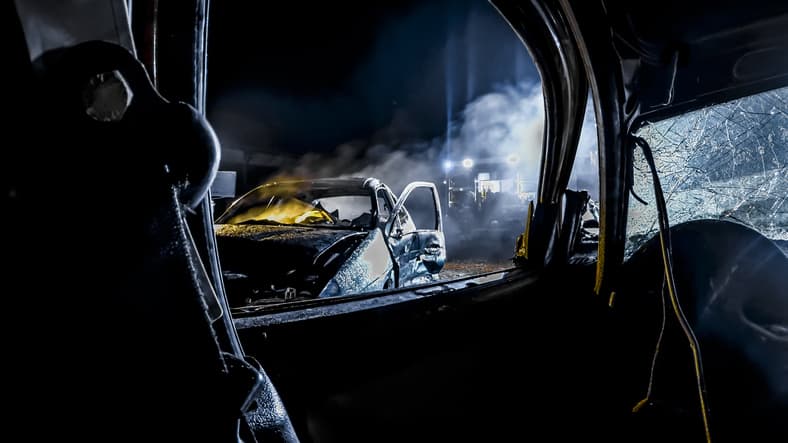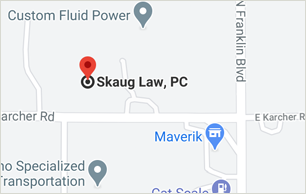How Are Car Accident Cases Different From 18-Wheeler Accidents?
Last updated Monday, April 11th, 2022

Being involved in an auto accident is scary enough, but 18-wheeler accidents can be a total nightmare. Regular automobiles are roughly within the same size. Tractor-trailers are massive.
If you survive getting hit by one of these vehicles, your life may never be the same. Have you or a loved one been injured by an 18-wheeler? Let the best Boise truck accident lawyers fight for YOU! Contact Skaug Law to get the best representation at an affordable price.
What is the Difference Between a Car Accident and Truck Accident?
There are four main differences that set these two types of crashes apart.
- Amount of Damage. When two cars collide, damage may be limited. A semi-truck is much larger and can cause much more damage.
- Drivers. Passenger car drivers have a standard issue driver’s license. Truck operators are professionals. These drivers must hold a special license. Commercial motor vehicle drivers were trained how to avoid accidents because they drive for a living.
- Number of Injured Parties. Normal-size cars can only hold so many people. Drivers and passengers may be the only people injured in an auto accident. An 18-wheeler can wipe out several cars, a bus, pedestrians, a road construction crew, you name it. The list can get lengthy.
- Size. Semi-trucks are huge compared to the average car. If these two vehicles get tangled up, size usually wins against speed.
What Are Commercial Driver Standards?
A professional truck driver needs a Commercial Driver’s License (CDL). The Federal Motor Carrier Safety Administration (FMCSA) aims to keep public roads safe by enforcing rules.
Commercial motor vehicle drivers are held to higher physical, mental and emotional standards than passenger car drivers.
Guidelines for truckers are strictly regulated by the FMCSA. Rules dictate such things as:
- Alcohol and Drug Tests. Testing is done at both random and set times. This strategy aims to reduce impaired driving accidents.
- Cellphone Use While Driving. Truckers must comply with rules concerning hand-held portable devices. This policy helps keep operators focused while driving.
- Hours of Service (HOS). There is a maximum number of hours that on-duty truckers are allowed to drive. Drivers must rest within specified times as required. The goal is to prevent drowsy driving.
Are Truck Accidents More Severe Than Car Accidents?
Yes! Consider the average passenger car weighs roughly 4,000 pounds. A loaded semi-truck tips the scales somewhere in the 40-ton range. It won’t be a fair fight when these two vehicles meet.
If both vehicles are traveling at the same speed, the force felt upon impact can be 20 times more powerful than the average auto accident. Imagine a couple of other scenarios. A rig collides with a stationary vehicle. A semi-truck is unable to stop coming down a mountain before hitting cars.
These collisions can be devastating. If you’re fortunate enough to survive such an accident, this event may leave you forever changed. Common injuries include:
- Brain and Head Injuries. Anything from a concussion to a traumatic brain injury is possible. Lasting impacts of such an ordeal may never go away.
- Broken Bones. Multiple fractures, sprains and breaks are all too familiar in this scenario.
- Burns. There’s a higher risk of a disastrous fire in an accident with a truck carrying hazardous materials.
- External Harm. Bruises, lacerations and cuts could be superficial. A lost limb, scarring or facial disfigurement can be both physically and emotionally painful.
- Internal Wounds. Organs impacted from internal bleeding may need lifelong care, depending on the severity.
- Spinal Cord Injuries. Something as minor as a headache can be triggered. Neck and back pain can occur due to dislocated discs or nerve damage. Paralysis may also appear.
- Wrongful Death. An 18-wheeler can end multiple lives with just one stroke. If your loved one was taken too soon because of a semi-truck accident, we want to help. Our compassionate team can walk you through the process of filing a wrongful death suit.
Do 18-Wheeler Accidents Cause More Damage?
Yes! Think of tractor-trailers as tornadoes on wheels. A crash with one of these supersize vehicles can leave a trail of devastation. Personal belongings, property and cars may need repair or replacing after colliding with a semi-truck.
While many 18-wheeler accident cases settle out of court, you must have an experienced lawyer to fight for monetary and punitive damages.
Potential Monetary Damages:
- Future Income Loss if You Become Unable to Work
- Lost Wages from Work Missed
- Necessary Home Renovations for Accessibility
- Personal Vehicle Repair or Replacement
- Surgery, Medical Treatment, Equipment, Therapy and/or Prescription Costs
Potential Damages That are Harder to Measure:
- Emotional Distress
- Loss of Limb(s), Disfigurement and/or Scarring
- Pain and Suffering
Potential Punitive Damages
These types of awards are possible. These damages typically only go to accident victims who’ve suffered extreme negligence. Distracted or drunk driving are cases where guilty drivers must pay as punishment.
Get Your Free Injury Case Review
How Many Parties are Liable in Semi-truck Accident?
This question can have many answers depending on the situation. A passenger car accident can generally point the finger of fault at one party. But a semi-truck? Not so much.
Who Could Potentially be Liable?
- Cargo Owner
- Dispatching Companies
- Drivers of Other Vehicles Involved
- Government Body in Charge of Keeping Roads in Good Shape
- Freight Loaders
- Manufacturer of Truck and/or Truck Parts
- Outfit Responsible for Maintaining Truck
- Truck Driver
- Truck Owner
- Trucking Company
Do Large Trucks Have Different Insurance Policies Than Cars?
Yes! Big trucks mean big bucks… for upkeep, fuel and insurance. A tractor-trailer accident can be catastrophic. Death and destruction are not only possible, they’re also likely.
Costs in a semi-truck accident are outrageous compared to those in a passenger car crash. Pricier insurance premiums are paid to protect assets.
It’s not uncommon for one 18-wheeler accident to cost millions of dollars. When this kind of money is on the line, the blame shifting game begins. These insurance companies will do whatever they can to pay the least amount possible.
If you want to get the highest amount you can, solid legal counsel is a must. Being without a savvy attorney is letting the truck run over you again. Our team at Shuman Legal knows how to deal with nervy insurers. We get high dollar settlements for clients like YOU!
How is Evidence Different in a Truck Crash Case?
Pictures, official reports and witness accounts can help regardless of vehicle type. When it comes to semi-truck accidents, there are extra clues that can show who’s at fault.
- Bill of Lading. This legal document contains information about the freight, involved parties and delivery address.
- Black Box Data. These data recorders can show important crash details. The speed a truck was traveling, if cruise control was in use and whether brakes were used can all be revealed.
- Cab Camera Footage. Cab cameras are a way to record events along the road. These tools can also show if the operator was driving recklessly or was distracted.
- Dispatch Instructions. Know where dispatchers told truckers to go and when to arrive. This intel could reveal if the truck was dispatched in accordance with United States Department of Transportation (USDOT) rules.
- Driver’s Information. Find out the trucker’s training level and medical history. Personnel records may expose red flags. Look for patterns of problematic behavior. Drug and alcohol test results can also help prove your case.
- Log Records. You’ll need logs, whether they’re from an electronic logging device or a logbook. Truckers must document time spent driving, sleeping and fueling. These records will show if a trucker was complying before the accident.
- Maintenance, Repair and Inspection Records. Looking at how the truck has been cared for can provide a great deal of insight.
- Weight Information. The right amount of cargo must be properly loaded and secured. Truck scale weight ticket(s), loading dock reports and weigh station data all matter.

